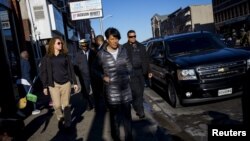Baltimore police are defending their response to Monday's violence, amid criticism that city officials did not respond quickly enough to the escalation of protests over the death of Freddie Gray.
Police Captain Eric Kowalczyk told reporters Tuesday it is important to put the situation in context.
"When we deployed our officers yesterday, we were deploying for a high school event," said Kowalczyk. "I don't think that there is anyone in the country that would expect us to deploy automatic weapons and armored vehicles to an event with 13, 14 and 15-year-olds. That's not what people expect from their police department."
Monday's violence began as hundreds of high school students marched toward a local mall after classes were dismissed for the day, then spread out across several neighborhoods, overwhelming the police department's ability to respond as the protests turned violent. The riots followed the funeral for 25-year-old Gray, an African American man who died earlier this month in police custody.
Kowalczyk said at least 20 police officers were injured in the riots, but the department expects that number might be a little higher. He also reported 144 vehicle fires and said one person was in critical condition as a result of a structure fire.
He said it is clear the dynamic of the demonstrations changed from what was originally supposed to be a youth protest, noting that out of 235 arrests, just 34 were under the age of 18.
Baltimore Mayor Stephanie Rawlings-Blake also has faced questions over her response to the outcry over Gray's death.
Rawlings-Blake told a news conference Saturday she had worked with police to make sure protesters were able to exercise their right to free speech, calling it "a very delicate balancing act."
"We also gave those who wished to destroy, space to do that as well," she said - comments that drew fierce criticism following Monday's destruction, with some accusing the city's African American mayor of encouraging violence.
Rawlings-Blake denied deliberately allowing rioting, however, and blamed the media for twisting her words.
"I did not say that we were accepting of that. I did not say that we were passive to it. I was just explaining how property damage can happen during a peaceful protest," she said. "It is very unfortunate that members of your industry decided to mischaracterize my words and try to use it as a way to say that we were inciting violence."




